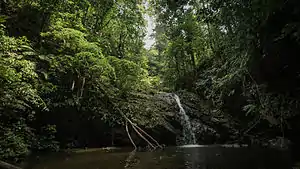Trinidad and Tobago moist forests
The Trinidad and Tobago moist forests ecoregion (WWF ID:NT0171) covers most of Trinidad Island and Tobago Island near the coast of South America where the southeastern Caribbean Sea meets the Atlantic Ocean. Small portions of the islands around river estuaries and coastal lowlands are mangroves or dry forests. Species diversity is very high, in particular for plants (over 2,500 species) and birds (over 400 species). Tobago, being much smaller, has fewer species.[1][2] [3] [4]
| Trinidad and Tobago moist forests | |
|---|---|
 Waterfall in Waterfall in Grande Riviere, Trinidad | |
 Ecoregion territory (in blue dashed box) | |
| Ecology | |
| Realm | Neotropic |
| Biome | Tropical and subtropical moist broadleaf forests |
| Borders | Trinidad and Tobago dry forests and Trinidad mangroves |
| Geography | |
| Area | 4,662 km2 (1,800 sq mi) |
| Country | Trinidad and Tobago |
| Coordinates | 10.45°N 61.25°W |
Location and description
Approximately 90% of islands are in this ecoregion. There are a few scattered mangroves of the Trinidad mangroves ecoregion at the main river estuaries, a ring of dry forest of the Trinidad and Tobago dry forests ecoregion around the Caroni Swamp, just south of the capital city of Port of Spain, and a small section of dry forest at the northeast end of Tobago. The islands are affected by the South Equatorial Current from the southeast and the outlflow from the Orinoco River to the south. Elevations in the islands are 841 metres (2,759 ft).
Climate
The climate of the ecoregion is Tropical monsoon climate (Köppen climate classification (Am)). This climate is characterized by relatively even temperatures throughout the year (all months being greater than 18 °C (64 °F) average temperature), and a pronounced dry season. The driest month has less than 60 mm of precipitation, but more than (100-(average/25) mm. This climate is mid-way between a tropical rainforest and a tropical savannah. The drier months are in the winter.[5][6]
Flora and fauna
The island of Trinidad is only 20 km from the mainland of South America, and a land bridge existed as late as 1,500 years ago. So the flora and fauna are most similar to those of the continent. The island of Tobago is a further 40 km from the northern edge of Trinidad, and its land bridge disappeared 11,500 years ago, but its species mix is similar to the larger island.[1] Over 60% of the island is still covered with closed broadleaf evergreen forest.[3]
The islands have high species diversity, with over 2,500 species of plants identified, of which up to 110 are endemic to the island. Also reported 100 species of mammals (bats and rodents predominate), 400 of birds, 85 of reptiles, and 30 of amphibians.[1] Characteristic tree species are andiroba (Carapa guianensis), andiroba (Ceiba pentandra), yellow mombin (Spondias mombin), Pentaclethra macroloba, and Brownea latifolia. A notable tree species in eastern Trinidad is the Mora tree.[1]
Protected areas
Officially protected areas in the ecoregion include:
References
- "Trinidad and Tobago moist forests". World Wildlife Federation.
- "Map of Ecoregions 2017". Resolve, using WWF data.
- "Trinidad and Tobago moist forests". Digital Observatory for Protected Areas.
- "Trinidad and Tobago moist forests". The Encyclopedia of Earth.
- Kottek, M., J. Grieser, C. Beck, B. Rudolf, and F. Rubel, 2006. "World Map of Koppen-Geiger Climate Classification Updated" (PDF). Gebrüder Borntraeger 2006. Retrieved September 14, 2019.CS1 maint: multiple names: authors list (link)
- "Dataset - Koppen climate classifications". World Bank. Retrieved September 14, 2019.